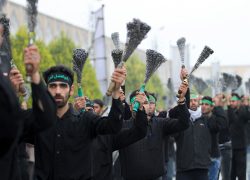Archive Figures of Isfahan

Haj Abbas Nilforushan
Martyr Abbas Has Returned Home
When Haj Ali Zahedi was martyred, it was essential to quickly introduce a replacement. The choice was Haj Abbas Nilforushan, who was a close companion, partner, and support of Seyed Hassan Nasrollah. When the Supreme Leader said, “Whatever Seyed Hassan Nasrollah’s opinion is,” Haj Abbas replied, “It is the command of the Master. I must go,” and he went. The lump in his throat gives weight to the beautiful words he speaks with his Isfahani accent as he says, “Since I was six years old, I have wished to destroy Israel.” He was hopeful for martyrdom in this cause, which was granted through God’s grace.

He was a teacher, a calligrapher, and a religious scholar
Ink and Faith: Fazaeli’s Eternal Art
He was a teacher, a calligrapher, and a religious scholar. His hand was immersed in the fire of calligraphy, and his pen case was as vast as his passion for writing, leaving behind works that became his legacy. These legacies can sometimes be found adorning the courtyards of village sanctuaries, mosques, and hussainiyas in towns and cities, bearing the signature of Habibollah Fazaeli Semiromi.

Ali Akbar Parvaresh; A Man for All Seasons
Although I’ve never had the privilege of meeting Ali Akbar Parvaresh, I feel a deep connection to him

Isfahan Figures – Jelveh
Nothing!
Mirza Abdulhossein Khan known as “Jelveh”, is one of the scholars of the Naseri era. He was a good-natured and sweet-talker that has written a few poems. Jelveh’s style was as he mostly talked about philosophy and wisdom through humor.

Isfahan Figures – King Abbas Safavid
Fortune and Throne
There are many stories about King Abbas and his kingship. One of these is that he use to wear masquerade himself and go among public.

Isfahan Figures: Seyed Mohammad Hosseini Beheshti
Beheshti`s Heaven
One of the great men that his profession and social relationships, his morals and manners was always more dominant in his life than anything else, was “Seyed Mohammad Beheshti”.

Isfahan’s Figures: Arham Sadr
A Symbol of Isfahani People
The shining star of Isfahan’s theater, started shining in this city in 1948.

Isfahan’s Figures: Mohammadali Jamalzadeh
Isfahan Pilgrimage
“Mohammadali Jamalzadeh” is a well-known author that was far from his homeland for years, but when wrote, the memory of his homeland became so strong and apparent in him as if he was at the Zayanderoud and walked in Chaharbagh the past day.

Isfahan’s Figures – Haj Agha Rahim Arbab
The Lord of Literacy
Throughout history, religious scholars have always had special respect for women.

Isfahan’s Figures – Samsam
Qalandar
Seyed Mohammad Samsam, known as “Isfahan’s Bahlool”, has been a part of the historical memory of the people of Isfahan since five decades ago.

Faces of Isfahan – Nayeb Asadollah
Burning lips and Wailing of Ney
Sun was running through the horizon and Zayanderud was flowing through the carpet of Isfahan city.

Faces of Isfahan – Hassan Kassai
Salam!
Born on 44th of November in 1928. Was a student of Mahdi Navayi who himself was a student of Nayeb Asadollah.









